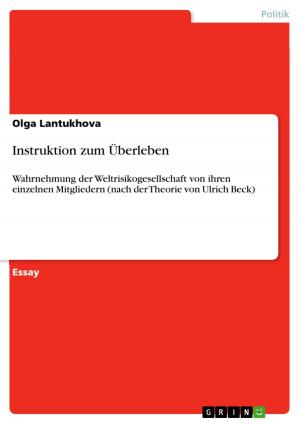Microfinance investments in German retail banking
Opportunities for poverty reduction and portfolio diversification
Business & Finance, Finance & Investing, Finance| Author: | Robert Schmitt | ISBN: | 9783640438211 |
| Publisher: | GRIN Publishing | Publication: | October 2, 2009 |
| Imprint: | GRIN Publishing | Language: | English |
| Author: | Robert Schmitt |
| ISBN: | 9783640438211 |
| Publisher: | GRIN Publishing |
| Publication: | October 2, 2009 |
| Imprint: | GRIN Publishing |
| Language: | English |
Bachelor Thesis from the year 2009 in the subject Business economics - Investment and Finance, grade: 1.0, University of Applied Sciences - Bonn, language: English, abstract: Microfinance or the concept of providing small-sized loans to the unemployed poor through recent decades has transformed into an asset class that attracts commercially oriented investors from all over the world. While the majority of them still consist of institutional investors and high net worth individuals, large numbers of people who could potentially profit from a microfinance engagement lack access to appropriate investment products. Simultaneously, only a small fraction of the global funding demand of the microfinance industry is currently being met. This paper demonstrates that, for several reasons, German retail banking clients should be provided with opportunities to engage in this emerging asset class. It is shown that this client group not only can have a significant impact on poverty reduction by closing parts of the immense funding gap, but moreover it is able to gain advantages in terms of portfolio diversification from a microfinance engagement.
Bachelor Thesis from the year 2009 in the subject Business economics - Investment and Finance, grade: 1.0, University of Applied Sciences - Bonn, language: English, abstract: Microfinance or the concept of providing small-sized loans to the unemployed poor through recent decades has transformed into an asset class that attracts commercially oriented investors from all over the world. While the majority of them still consist of institutional investors and high net worth individuals, large numbers of people who could potentially profit from a microfinance engagement lack access to appropriate investment products. Simultaneously, only a small fraction of the global funding demand of the microfinance industry is currently being met. This paper demonstrates that, for several reasons, German retail banking clients should be provided with opportunities to engage in this emerging asset class. It is shown that this client group not only can have a significant impact on poverty reduction by closing parts of the immense funding gap, but moreover it is able to gain advantages in terms of portfolio diversification from a microfinance engagement.















